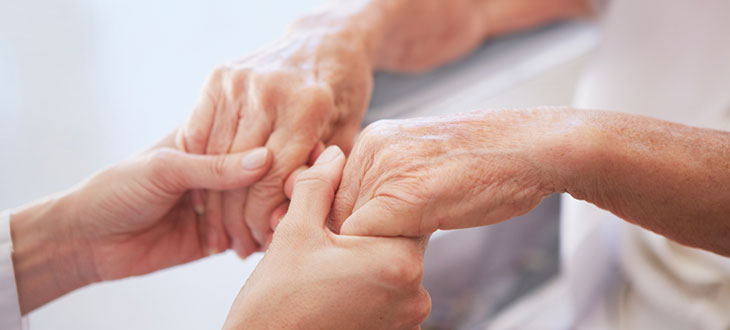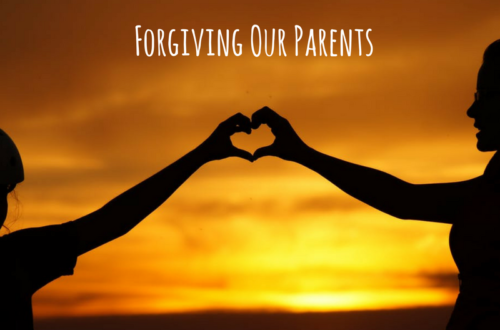I learned from experience that when a person is dying, we tend to focus on physical needs, and often neglect the person inside. It’s a common defense mechanism that allows us to emotionally detach from a horrible reality while managing to remain physically present. During the final week of my mother’s life, I was determined to do it differently by staying in contact with her mind and spirit because most of our dignity is housed in the parts of us that make us human.
My mother’s physical weakness during her last days guaranteed many opportunities to prop her up and lay her down, provide sips of water, and lift her between bed and commode, but I wanted our relationship during those last days to be about more than just her failing body.
In 2009 I heard a song called, “Will I?”. It was written by Jonathan Larson for the musical, RENT, and contains only these lyrics:
“Will I Lose my Dignity? Will Someone Care? Will I Wake Tomorrow from this Nightmare”?
http://https://www.youtube.com/watch?v=CCVJnh1teqk
I always understood Larson’s use of the word, “care” to mean preservation of dignity through tending to the entire person. Had I not done that, I would have reduced my mother to an object shuffled around until it found a final resting place. Thankfully, my mother experienced several moments of lucidity in the days before she died.
Between long periods of sleep, my mother was alert and aware. Because she knew my name, what year it was, and sneered when I asked who our president is, I believed she was oriented enough to understand what was happening to her. I made her experiences a central focus of our conversations, inquiring about her thoughts, and validating them while dealing with the powerlessness of not being able to extend her life. I figured, if I couldn’t ensure quantity, I could offer quality.
Preserving my mother’s dignity meant acknowledging some of the more uncomfortable situations created by her limited mobility and strength. The discomfort of transitioning her from commode to bed was inevitable, so I asked her to express her feelings because they still mattered. It was rare I had to lift her from bed to commode because in her desire to maintain her own dignity, she did it herself when no one was looking. It just so happened her effort cost her all the energy she had at that moment, and she needed her sons to pull up the diaper she never wanted us to see, and place her back in her bed. It would have been easy to pretend only I was embarrassed, but she was there too, and I wanted to know as much as I could about what this reversal of roles meant to her, even through humor about her last expulsions of waste.
To keep our relationship reciprocal, I continued sharing my life with my mother, speaking about my kids and work because moms want to know what’s happening in the lives of their children, and she was still my mom. Sharing my life reminded her she remained part of it instead of feeling as if it was going on without her. Whenever I shared work experiences with my mom, I honored her as the person whose devotion to helping others influenced my career choice. She may have never earned a degree, but she was a better social worker than I ever was, and telling my mom about the legacy she was leaving was essential to preserving her dignity.
Nothing more dignified my mother than the impromptu living wake that took place that week. Friends and family spent time at her bedside talking as they had during her countless dinner parties. I never really got used to my mother’s voice being reduced to a raspy whisper, but her spirit remained, and that’s what people assured me they heard. Although I was tempted to be selfish with our remaining days, I knew mom would want to host, even if the party was relegated to her bedside. As people came and left, I asked her what it was like to see a few she hadn’t in years. I suspected she knew it meant she was dying, and we acknowledged that together because ignoring the truth would have insulted her intelligence.
Eventually, my mother’s condition necessitated she be where she’s receive constant care. That conversation was harder than her moment of death because I knew she believed nursing homes to be places with no exits. I could have pretended she no longer experienced anxiety, but she still experienced emotions, and they deserved to be acknowledged. At that point her voice was so weak she expressed her feelings through her eyes, and although powerless to allay her fears, I assured her she would not be alone when she died. When she took her last breath only forty-eight hours after arriving in the facility, I held her left hand, and my youngest brother her right.
Maintaining my mother’s dignity meant refusing temptation to deny she was dying by detaching from my own feelings, which would’ve also detached me from my mother when she most needed connection. Because her mind and soul was still alive, I stayed in touch with them because they are what most comprised her humanity, and where the majority of her dignity lived.
I don’t know if mine was the right way, or the best way, but I knew my mother valued dignity, and I knew where she most closely held it. By remaining in contact with those parts she most valued, I ensured dignity would never be lost, that there would be no nightmare, and that what she valued most was cared for until she was ready to leave.






2 Comments
Nyxinked
This is so relevant and hard hitting for me to read at the moment. My grandfather is currently, as we speak, dying from terminal bowel cancer diagnosed just 3 weeks ago. My grandmother (on my fathers side) is dying of terminal liver cancer, she was given 6 months at Christmas.
It’s not a coincidence that you tweeted me this to read. This was both hard but helpful, if that makes sense.
Thank you for sharing, thank you for somehow seeing my tweet and knowing to send me this.
– Nyxie
https://www.nyxiesnook.com/how-to-look-after-someone-with-depression-according-to-matt-haig/
Vincent
I’m so, so sorry to hear you are experiencing so much loss at one time. I hope you value every remaining moment, and I’ll be keeping a good thought for you and your family.